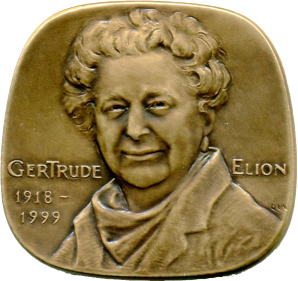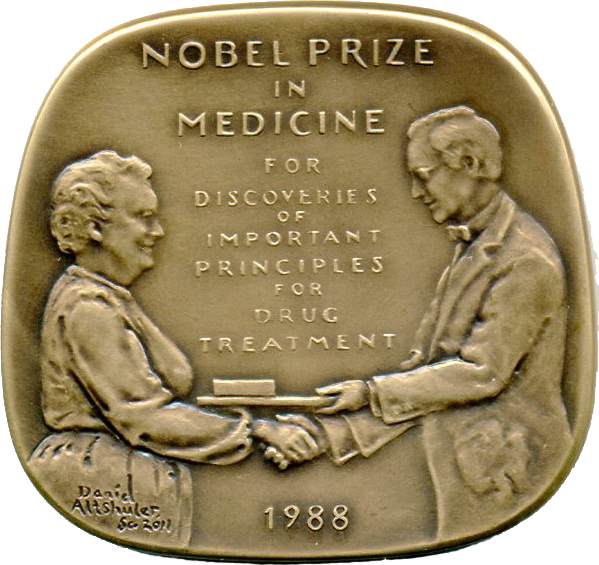 |  |
Medal designed by Daniel Altshuler, struck by Medalcraft Mint in quantities of 125 bronze,
75 silver-plated bronze, and 25 gold-plated bronze. Obverse: Portrait, GERTRUDE ELION 1918-1999, DIA.
Reverse: Elion and Carl XVI Gustaf, the King of Sweden, NOBEL PRIZE IN MEDICINE FOR DISCOVERIES
OF IMPORTANT PRINCIPLES FOR DRUG TREATMENT 1988, Daniel Altshuler SC 2011. 49 x 47 mm.
Gertrude Elion’s exceptional accomplishments over the course of her long career as a chemist include the development of the first chemotherapy for childhood leukemia, the immune-suppressant that made organ transplantation possible, the first effective antiviral medication, and treatments for lupus, hepatitis, arthritis, gout, and other diseases. With her research partner, George Hitchings, she revolutionized the way drugs were developed, and her efforts have saved or improved the lives of countless individuals. Elion stated: “It’s amazing how much you can accomplish when you don’t care who gets the credit.”
Gertrude Belle Elion was born in New York City on January 23, 1918. Soon after graduating from high school, young Gertrude watched her beloved grandfather die painfully of stomach cancer, and deciding:“nobody should suffer that much,“ she dedicated herself to finding a cure for cancer. In 1937, at the age of 19, Elion graduated from Hunter College summa cum laude and Phi Beta Kappa. Many years later, Elion created a scholarship at Hunter College for female graduate students in chemistry.
Unable to find a suitable position, she began volunteering in a chemistry lab, enduring daily anti-Semitic jokes from the company president but gaining valuable experience. By the end of a year and a half, she was paid $20 a week, out of which she saved enough to enroll at New York University. The only woman in her graduate chemistry classes, she wrote her thesis at night and on weekends while working first as a doctor’s receptionist and then as a substitute teacher of high school chemistry and physics. In 1941, she received her Master’s degree.
In June 1944, Elion was interviewed by Dr. George Hitchings of Burroughs Wellcome (now GlaxoSmithKline), the pharmaceutical company. Elion was intrigued by Hitchings’ research project; and he was impressed by the young woman’s intelligence and energy. Over the next decades, the Hitchings-Elion partnership proved immensely fruitful.
In 1950, Elion synthesized a compound (6-MP) that caused complete remissions in children with leukemia, but a relapse invariably followed. After further research, it was discovered that when 6-MP was combined with other medications, approximately 80% of child leukemia patients would be cured. Prior to 6-MP, half of all children with acute leukemia died within a few months.
In 1958, a young British surgeon used 6-MP to temporarily prevent the rejection of a transplanted kidney in a dog. Excited, Elion gave him several similar compounds, in the hopes that one would be even more effective. The following year, he used Elion’s drug azathioprine (known as Imuran), to transplant a kidney successfully into a dog named Lollipop. In 1961, doctors used Imuran to perform the first successful kidney transplant between two unrelated humans. Thanks to Elion’s work, organ transplantation has become routine today.
After several years of work, the Burroughs Wellcome team triumphantly unveiled acyclovir (Zovirax), the first medication effective against viruses. Elion later referred to acyclovir as her “final jewel…. That such a thing was possible wasn’t even imagined up until then.”
In 1964, Gertrude Elion received a call from George Mandell of George Washington University, who said, “The kind of work you’re doing, you’ve long since passed what a doctorate would have meant. But we’ve got to make an honest woman of you. We’ll give you a doctorate, so we can call you ‘doctor’ legitimately.” This was the first of 25 honorary doctorates Elion received.
When it was discovered that one of her drugs was an effective treatment for Leshmaniasis disease, a serious problem in South America, she pushed hard for Burroughs Wellcome to follow up on the matter, regardless of the money involved. As a former colleague remarked, “She has a real social conscience…. In fifty years,Trudy Elion will have done more cumulatively for the human condition than Mother Theresa.”
In 1988, Elion received the Nobel Prize in Medicine “for discoveries of important principles for drug treatment,” together with Dr. Hitchings and Sir James Black. Few Nobels have gone to scientists working in the drug industry or those without Ph.D.s, and even fewer to women. Gertrude Elion was only the fifth female Nobel laureate in Medicine, and just the ninth in science. In 1991 she was awarded the National Medal of Science and became the first woman to be inducted into the National Inventors Hall of Fame.
This information was excerpted from the Jewish Women’s Archive.